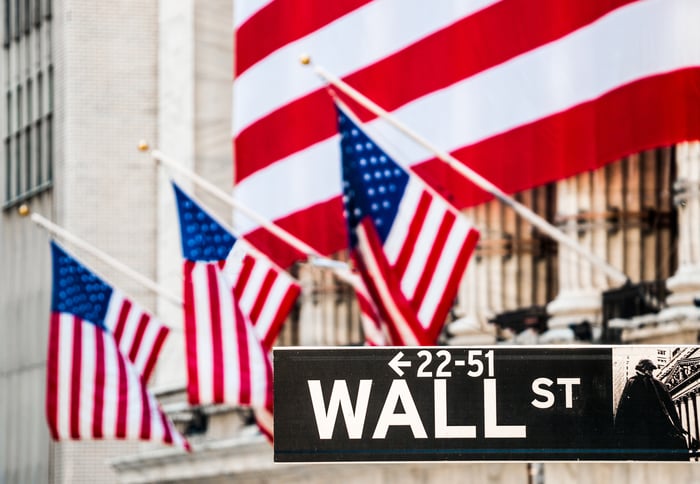In two months, the iconic Dow Jones Industrial Average (^DJI 0.07%) will celebrate its 126th "birthday." Since its founding in May 1896, it's evolved from a 12-stock, industrial-dominated index to one that now houses 30 highly successful and diverse multinational companies.
It's also an index full of stocks that have a rich history of making patient investors money. Over the next eight years, three Dow stocks stand out as having a good chance to outperform their peers. If you invest $300,000 into these Dow components now, they have the tools and intangible needed to potentially make you a millionaire by 2030.

Image source: Getty Images.
Salesforce
The Dow stock I feel most confident about increasing in value by 233% over the next eight years is cloud-based customer relationship management (CRM) software solutions provider Salesforce.com (CRM -0.79%). Salesforce has averaged an annual gain of nearly 27% for shareholders since March 2005. In other words, it doubles, on average, every 2.7 years.
CRM software is used by consumer-facing businesses to enhance existing customer relationships and boost sales. Some of the more common tasks businesses utilize CRM software for include overseeing online marketing campaigns, handling product and service issues, and running predictive sales analyses. The latter can be particularly helpful in determining which clients would be likeliest to purchase a new product or service.
As you might have guessed, CRM software is geared toward the service industry. However, it's made inroads in the financial, healthcare, and industrial sectors in recent years. CRM software is fully expected to offer low double-digit annual global growth potential through at least mid-decade, if not beyond.
Salesforce slots in as the undisputed No. 1 of global CRM spending. According to a report from IDC, Salesforce accounted for almost 24% of global CRM spend in the first-half of 2021. By comparison, its four-closest competitors in market share didn't even add up to 20% on a combined basis. Salesforce is the go-to CRM solutions provider and is unlikely to cede significant share anytime soon.
It's also a company that's benefited immensely from inorganic growth. CEO and founder Marc Benioff has made a number of amazing acquisitions, including MuleSoft, Tableau Software, and Slack Technologies. These deals not only expand the company's sales channels, but they allow Salesforce to reach a broader audience of small-and-medium-sized businesses with their ecosystem of solutions.
Benioff is forecasting a near-doubling in full-year sales by mid-decade ($50 billion in fiscal 2026), making Salesforce the fast-growing Dow component investors should want to own.

Image source: Getty Images.
UnitedHealth Group
Another Dow stock that can turn a $300,000 investment into $1 million by 2030 is insurance and healthcare solutions giant UnitedHealth Group (UNH 1.00%). Over the past 25 years, UnitedHealth has averaged an annual return of around 19%. If we include dividends, this average annual return jumps to about 20%. This means the company has been doubling investors' money, on average, every 3.6 years.
UnitedHealth is probably best known for its insurance segment. Even though health insurance tends to be a relatively slow-growing operating model, it's very profitable. Insurance companies are typically able to pass along higher premiums to counteract rising costs.
Aside from strong premium pricing power, UnitedHealth can continue to benefit from the existence of the Affordable Care Act (ACA)(sometimes referred to as "Obamacare"). Despite the ACA requiring insurers to accept people with pre-existing conditions, it also encouraged a lot of healthier people to purchase insurance as well.
However, the real growth driver for UnitedHealth Group is its healthcare services subsidiary, Optum. Optum has three segments of its own, which provide everything from pharmacy prescription refills to data analytics and software to healthcare organizations. Optum has consistently grown faster than the insurance segment, and it generally produces higher margins, too. Thanks mostly to Optum, Wall Street's consensus estimate calls for UnitedHealth to grow its full-year sales from $287.6 billion in 2021 to more than $497 billion by 2026. That's incredible sales growth for a megacap company.
At its current growth trajectory, I believe UnitedHealth Group has the potential to more than triple its earnings per share by 2030 to north of $60, which in turn should send its shares a lot higher.

Image source: Getty Images.
Visa
A third and final Dow stock with the ability to turn $300,000 into $1 million by 2030 is payment processor Visa (V 0.08%). Over the trailing 14 years, Visa has averaged an annual total return, including dividends paid, of around 21%. This means it's doubled investors' money, on average, every 3.4 years.
The most logical reason to buy Visa is the company's cyclical ties. In short, it does well when the U.S. and global economy are expanding, and it struggles a bit during recessions when consumers and businesses don't spend as much. The thing is, recessions typically last for a few months or a couple of quarters, whereas periods of economic expansion are usually measured in years. Visa is the type of company that allows patient investors to take advantage of the natural long-term expansion of the U.S. and global economy.
But let's be clear, it also doesn't hurt that Visa controls a majority of credit card market share by network purchase volume in the U.S. -- the largest market for consumption in the world. Between 2009 and 2018, no payment processor saw a bigger jump in U.S. network purchase volume share than Visa. In fact, Visa's 53.1% share in 2018 was 31 percentage points higher than its next-closest competitor.
Additionally, Visa has a long runway with which to expand its payment infrastructure. It can do so via acquisition, as it did with Visa Europe in 2016, or it can organically push into underbanked markets, such as the Middle East, Africa, and Southeastern Asia. With much of the world still reliant on cash for transactions, Visa looks to be sitting on a multidecade opportunity.
Lastly, take into consideration that Visa purely acts as a payment processor and not a lender. Although lending would allow the company to reap the rewards of interest income and fees during long periods of economic expansion, it would also expose it to loan delinquencies during recessions. Not lending means not having to set aside capital to cover delinquencies. This is why Visa bounces back quicker than virtually all other financial stocks following a recession or economic contraction.





